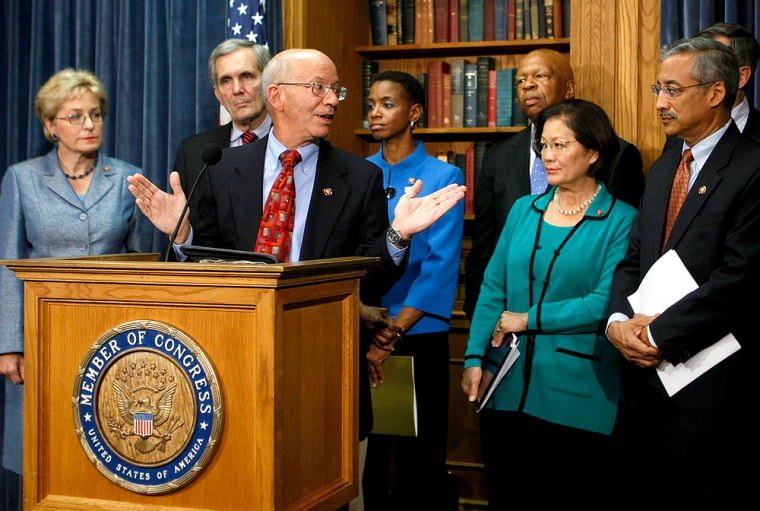The Bush administration is searching for a new way to sell its financial rescue plan after acknowledging some blunders and missteps in presenting it the first time around. One big key: Insist it's not a Wall Street "bailout."
Now it's not about financial institutions. The focus has switched to everyday Americans. And it's not an expenditure of taxpayer money, it's an "investment."
This was clearly evident in Bush's grim warnings on Tuesday of "economic hardship for millions" if the plan can't be revived. He declared, "For the financial security of every American, Congress must act."
Late Tuesday, the Senate announced it would vote on the proposal Wednesday night.
This emphasis was echoed on the presidential campaign trail.
"Let's not call it a bailout. Let's call it a rescue," said Republican John McCain.
Democratic rival Barack Obama said, "This is no longer just a Wall Street crisis — it's an American crisis, and it's the American economy that needs this rescue plan."
House Speaker Nancy Pelosi's take: Its not a bailout but "a buy in, so that we can turn our economy around."
Bush, McCain, Obama and top congressional leaders agree the plan — which would nationalize large numbers of bad mortgages and securities tied to them — is needed to unclog the nation's financial arteries.
But it proved extremely unpopular across the country and was rejected on Monday in the House, a stunning setback to the administration that led to a dizzying 778-point plunge in the Dow Jones industrials. The Dow bounced back 485 on Tuesday amid word of efforts to salvage the plan.
Language seemed to matter.
An AP-Knowledge Networks poll last week that asked whether people supported Bush's proposed federal "bailout" of financial institutions found only 30 percent backing it. Surveys by the nonpartisan Pew Research Center that asked whether people support "investing" or "committing" billions to keep markets secure found slightly more favoring the plan than opposing it.
White House spokesman Tony Fratto agreed the administration's initial efforts to explain the legislation to Congress and the public left something to be desired.
"We need to be able to better demonstrate that there are impacts for American families, for retirees, for small businesses, for larger businesses who are hiring, for our banking system, for the ability to get home loans, for businesses to be able to make their payrolls, their small-business accounts," Fratto said.
He said "it's a hard thing to do" because of the complexity of both the problem and the solution. "There are four or five steps involved ... before you get to the kitchen table of the average American family and how it affects them."
Bush was trying on Tuesday.
"The dramatic drop in the stock market that we saw yesterday will have a direct impact on retirement accounts, pension funds and personal savings of millions of our citizens," he said.
From the initial three-page request by Treasury Secretary Henry Paulson for unchecked powers to spend up to $700 billion with no oversight to the confusing explanations for why the plan was needed, the Bush administration's sales pitch has followed a rocky path.
Perhaps because he was the former CEO of investment bank Goldman Sachs, Paulson talked to lawmakers about the plan in Wall Street-speak.
The treasury secretary and Federal Reserve Chairman Ben Bernanke spent more than 10 hours before congressional committees last week trying to explain to skeptical lawmakers why the rescue package was not a Wall Street bailout.
It was not an easy sell, in part because Paulson and Bernanke occupy jobs where most of the time they go out of their way to sound upbeat so as not to spook investors and send the markets crashing. But, as Senate Majority Leader Harry Reid, D-Nev., noted after one negotiating session, "We deal with Wall Street but we also deal with Main Street."
"Those appointed officials, like Paulson and Bernanke, are going to have to become more realistic," Reid said.
To many lawmakers, the request to put so much taxpayer money at risk was politically toxic — too risky right before an election, in a vote that an opponent could cast as a bailout for Wall Street.
"Lawmakers were upset because Secretary Paulson was asking them to give him a blank check and just go away. I think some of them were offended by what he presented to them initially," said Sung Won Sohn, an economics professor at the Martin Smith School of Business at California State University, Channel Islands.
Bush himself appeared uncomfortable in talking about the crisis at first. He used phrases like "a substantial step to provide additional liquidity to the U.S. financial system." And "the American people can be sure we will continue to act to strengthen and stabilize our financial markets and improve investor confidence."
Now Bush is seeking to relate the crisis more directly to family and small-business economics.
Is there time?
Wayne Fields, an expert on political rhetoric at Washington University in St. Louis, said "talking about it as a bailout has hurt" the plan's chances. That's because most Americans don't understand the intricacies of what's involved but can relate to seeing their tax dollars used to reward those who helped create the mess in the first place.
"I don't think you can change the language now," he said.
